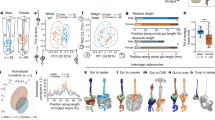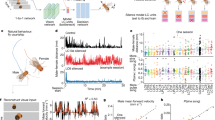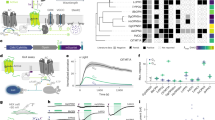Abstract
THE mechanism controlling the periodic reversal of the heart-beat in tunicates is still in dispute. Internal control has been thought to exist, and to be due either to local nerve centres1, or to physiologically differentiated areas of cardiac muscle2, at each end of the heart. Evidence from the action of drugs has been conflicting3. Hunter1 found a ring of cells around each end of the heart which he thought to be nerve cells, and Alexandrowicz4 described nerve fibres but was uncertain whether ganglion cells exist.
This is a preview of subscription content, access via your institution
Access options
Subscribe to this journal
Receive 51 print issues and online access
$199.00 per year
only $3.90 per issue
Buy this article
- Purchase on Springer Link
- Instant access to full article PDF
Prices may be subject to local taxes which are calculated during checkout
Similar content being viewed by others
References
Hunter, G. W., Anat. Anz., 21 (1902).
von Skramlik, E., Z. vergl. Physiol., 4 (1926).
Bacq, Z. M., Bull. Acad. Belg., Cl. Sci., (5), 20 (1934). Waterman, A. J., Physiol. Zool., 15 (1942); 16 (1943).
Alexandrowicz, J. S., Z. allg. Physiol., 14 (1913).
Lahille, F., “Contributions à l'étude anatomique et taxonomique des Tuniciers” (Toulouse, 1890).
Haywood, C. A., and Moon, H. P., J. Exp. Biol., 27 (1950).
Author information
Authors and Affiliations
Rights and permissions
About this article
Cite this article
MILLAR, R. Reversal of the Heart-beat in Tunicates. Nature 170, 851–852 (1952). https://doi.org/10.1038/170851b0
Issue Date:
DOI: https://doi.org/10.1038/170851b0
This article is cited by
-
Reversal of the Heart-beat in Tunicates
Nature (1953)
Comments
By submitting a comment you agree to abide by our Terms and Community Guidelines. If you find something abusive or that does not comply with our terms or guidelines please flag it as inappropriate.



